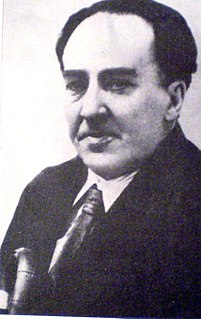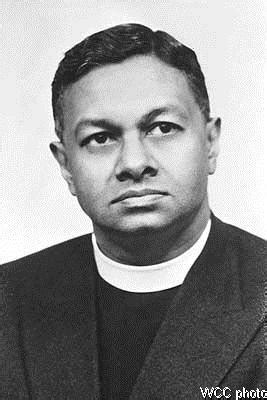A Quote by Georg Wilhelm Friedrich Hegel
The man whom philosophy leaves cold, and the man whom real faith does not illuminate, may be assured that the fault lies in them, not in knowledge and faith. The former is still an alien to philosophy, the latter an alien to faith.
Related Quotes
Faith in the biblical sense is substantive, based on the knowledge that the One in whom that faith is placed has proven that He is worthy of that trust. In its essence, faith is a confidence in the person of Jesus Christ and in His power, so that even when His power does not serve my end, my confidence in Him remains because of who He is.
Any man who stands for progress has to criticize, disbelieve and challenge every item of the old faith. Item by item he has to reason out every nook and corner of the prevailing faith. If after considerable reasoning one is led to believe in any theory or philosophy, his faith is welcomed. His reasoning can be mistaken, wrong, misled and sometimes fallacious. But he is liable to correction because reason is the guiding star of his life. But mere faith and blind faith is dangerous: it dulls the brain, and makes a man reactionary.
Everybody was talking about the religious man who committed suicide. While no one in the monastery approved of the man's action, some say they admired his faith. Faith?" said the Master. He had the courage of his convictions, didn't he?" That was fanaticism, not faith. Faith demands a greater courage still: to reexamine one's convictions and reject them if they do not fit the facts.
Experience has repeatedly confirmed that well-known maxim of Bacon's that 'a little philosophy inclineth a man's mind to atheism, but depth in philosophy bringeth men's minds about to religion.' At the same time, when Bacon penned that sage epigram... he forgot to add that the God to whom depth in philosophy brings back men's minds is far from being the same from whom a little philosophy estranges them.
For myself, I am interested in science and in philosophy only because I want to learn something about the riddle of the world in which we live, and the riddle of man's knowledge of that world. And I believe that only a revival of interest in these riddles can save the sciences and philosophy from an obscurantist faith in the expert's special skill and in his personal knowledge and authority.
Faith, faith, faith in ourselves, faith, faith in God, this is the secret of greatness.If you have faith in all the three hundred and thirty millions of your mythological Gods, and in all the Gods which foreigners have now and again introduced into your midst, and still have no faith in yourselves, there is no salvation for you.
My philosophy is fundamentally sad, but I’m not a sad man, and I don’t believe I sadden anyone else. In other words, the fact that I don’t put my philosophy into practice saves me from its evil spell, or, rather, my faith in the human race is stronger then my intellectual analysis of it; there lies the fountain of youth in which my heart is continually bathing.
Have faith in man, whether he appears to you to be a very learned one or a most ignorant one. Have faith in man, whether he appears to be an angel or the very devil himself. Have faith in man first, and then having faith in him, believe that if there are defects in him, if he makes mistakes, if he embraces the crudest and the vilest doctrines, believe that it is not from his real nature that they come, but from the want of higher ideals.
The help of God does not come to us when we are indifferent. It comes to the man who is depending on God in the thick of the fight. It comes to the one who tarries for the vision in faith. It comes to the one who believes that he who waits upon the Lord shall never be confounded. It comes to the one who rests upon the promises of the Word. It comes to the man who lives by faith as if in the actual possession of the answer to his prayer, although the enemy is still around him. It is faith which turns distress into singing.
The chief difficulty is that God demands of us that we live by faith: faith in God, God's sovereignty over the future, God's sufficiency for the present; while, on the other hand, the various other gods whom we can serve appeal to us in terms of the things which we can see and the forces which we can calculate. The choice between the life of faith and the life of sight is a choice between a God whom only faith can apprehend and gods whom one has only to see to understand.
Faith is indeed intellectual; it involves an apprehension of certain things as facts; and vain is the modern effort to divorce faith from knowledge. But although faith is intellectual, it is not only intellectual. You cannot have faith without having knowledge; but you will not have faith if you have only knowledge.







































